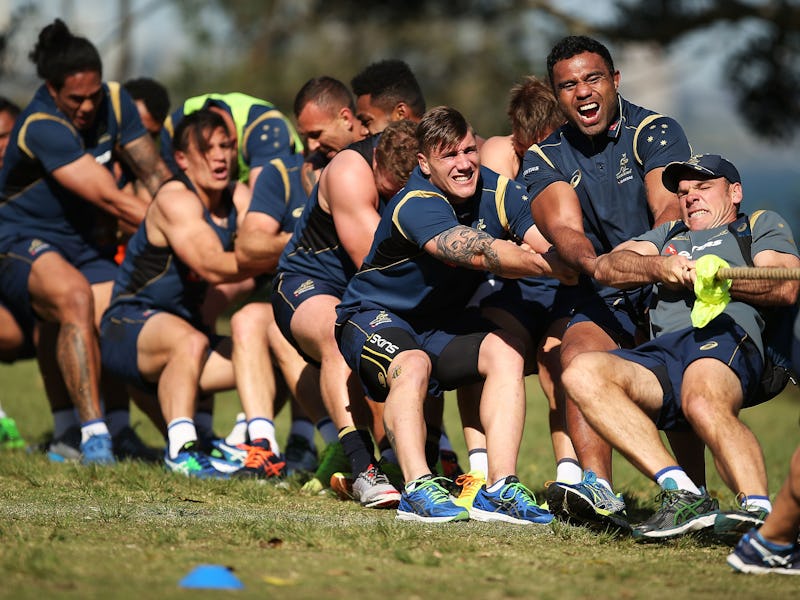Let's Bring Tug of War Back to the Olympics!
Screw golf: Humankind's most democratic team sport deserves to be reinstated.

Unlike the rest of us, the homegrown athletes of Port Byron, Illinois, won’t be spending this weekend glued to the Olympics. Instead, they’ll be pulling for their lives on one end of a 1,600-foot-long rope stretched across the Mississippi River in a gritty game of tug of war against their rivals in Le Claire, Iowa. In the annual matchup known as the Port Byron Tug Fest, only one team ever comes out dry.
If this sounds a hell of a lot more raw than throwing a javelin or sprinting down a track, that’s because it is. Tug of war — a game that requires no accoutrements other than a pair of strong hands and a rope — arguably is one of the purest displays of naked athleticism known to humankind. Which makes it all the more baffling that it isn’t an official part of the Olympic Games.
“Tug of war is the ultimate team sport,” Shelby Richardson, the president of the United States Tug of War Association, tells Inverse. Having been involved in the sport for over 40 years — she’s competed in every national championship since 1980 — Richardson will be the first to argue that it’s as good a test of athletic ability and sportsmanship as any of the sports officially included in the Olympics. In fact, because the sport is so simplistic in concept and practice, it allows an entirely egalitarian approach to testing athleticism, which more expensive, rich-kid Olympic sports such as fencing, dressage, and golf don’t exactly provide.
“There is no way to change up anything. The ground is fair for each,” Richardson says. “It’s a very simple game that everybody can relate to. It’s not like fencing — where you have to go out and learn the techniques of it — or judo, or karate.” She’s not saying that the sport’s practitioners don’t have their strategies — “It takes a lot of practice, like anything else,” she shrugs — but what’s important is that anyone, anywhere, could learn to play.
Even at the competitive level, the team selection process makes equality a priority. Because a team’s eight members must collectively meet a certain weight standard, it’s standard practice to select individuals that are roughly the same weight, Richardson says, “so that your team is strong all the way through.”
That the Tug of War International Federation lists 79 countries — spanning every continent except Antarctica — as member states only corroborates Richardson’s argument that the sport is one of humankind’s most democratic and classic. The sport has spanned millennia, making its professional sports debut in the original Olympic Games in Greece around the year 500 B.C. (long after it had been practiced in ancient rituals in the Middle East and Asia).
This point was not lost on earlier iterations of the International Olympic Committee. Tug of war was actually played during the Games between 1900 and 1920, lumped together with track and field events such as long jumping and shot put. During the sport’s Olympic lifespan, competitions were rife with controversy: In 1904, it turned out that the U.S. team, which was supposed to be made up of athletes from the Milwaukee Athletic Club, had recruited ringers from Chicago, and in 1908, the British team was called out for wearing cleated boots, which gave them an unfair advantage.
While we know the IOC has its fair share of reasons to avoid controversy at all costs, Richardson believes tug of war was cut, ultimately, to save money. “My personal opinion is that tug of war is hard to market,” she says. “You can market the Final Five. You can market Michael Phelps. But a tug of war team? You’ve got eight individuals, and I think it’s harder to do a team.” You could argue that team sports, like the U.S. Olympic basketball and soccer squads, get just as much publicity — if not more — than individual events, but even these have their own stars, which bring in viewers and their money. Tug of war, on the other hand, is about the team as an egalitarian whole.
The athletes that Richardson represents hail from what she calls the American “hotbed” of tug of war, centered largely in Wisconsin, Minnesota, Illinois, and Iowa. They’re not happy about the nearly 100 years of dismissal their sport has been subjected to at the hands of the IOC, but they haven’t been passive about it, either: As this year’s world championships in Mälmo, Sweden will demonstrate, the sport has been kept alive despite the snobbery of the Olympic powers that be. And as dozens of Midwesterners, hands raw from pulling, dig their heels into the shores of the Mississippi this weekend, they’ll be demonstrating true, raw athleticism.